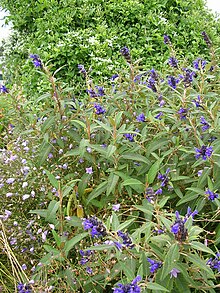| Salvia corrugata | |
|---|---|

| |
| Scientific classification | |
| Kingdom: | Plantae |
| Clade: | Tracheophytes |
| Clade: | Angiosperms |
| Clade: | Eudicots |
| Clade: | Asterids |
| Order: | Lamiales |
| Family: | Lamiaceae |
| Genus: | Salvia |
| Species: | S. corrugata |
| Binomial name | |
| Salvia corrugata Vahl | |
Salvia corrugata is a perennial shrub native to Colombia, Peru, and Ecuador, growing at 8000–9800 ft elevation. It was brought into horticulture about 2000 as a result of a collecting trip to South America in 1988. All the plants in cultivation today are from six seeds that germinated from that trip.
Salvia corrugata reaches 9 ft in its native habitat, and 5–6 ft in cultivation. It has egg-shaped deeply corrugated evergreen leaves that are 4.5 in by 1.5 in, dark green on the top surface, and light veining with pale tan-colored fine hairs underneath. The brilliant purple-blue flowers are 1 in long, with a small dark purple and green calyx. The flowers grow in congested whorls, with 6–12 flowers on each 3–4 in inflorescence.
Notes
- Clebsch, Betsy; Barner, Carol D. (2003). The New Book of Salvias. Timber Press. p. 88. ISBN 978-0-88192-560-9.
| Taxon identifiers | |
|---|---|
| Salvia corrugata | |
This Salvia article is a stub. You can help Misplaced Pages by expanding it. |